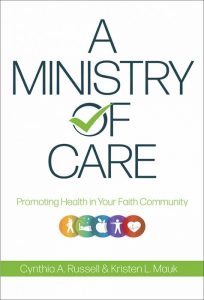Interview with Chad Jukes – Mountaineer
IRC’s interview with Chad Jukes. Chad lost his limb while serving in Iraq and now is a prolific mountain climber. Follow his upcoming climb in Ecuador with the Range of Motion Project (ROMP) in July on our social media. Dan Easton, our Social Media Director for IRC, will also be climbing with Chad and the elite ROMP team.
A Ministry of Care
A Ministry of Care
Promoting Health in Your Faith Community
Churches tend to focus—rightly so—on spiritual care for parishioners, but what if your church also had a healthcare ministry? Health-related concerns affect the majority of individuals at some point in their lives. Whether it’s facilitating healthcare clinics, hosting seminars by medical professionals, or helping congregants navigate the complex healthcare system, A Ministry of Care explores a variety of ways for any church to become a place where people can be ministered to in spirit, mind, and body. Advanced practice nurses Cynthia Russell and Kristen Mauk guide you through the steps toward starting and sustaining a health-oriented ministry in your church. Pastors, church board members, or motivated lay members can take advantage of the professional tips and advice shared in this handbook in order to better care for the physical well-being of the members in their church and the community beyond.
Cynthia A. Russell
Dr. Cynthia A. Russell is dean and professor of nursing at Holy Family
University, School of Nursing and Allied Health Professions in Philadelphia,
Pennsylvania. Prepared as a psychiatric mental health clinical nurse
specialist, she is also a certified health and wellness coach. She is the
mother of five children and grandmother to four.
Kristen L. Mauk
Dr. Kristen L. Mauk has nearly forty years of teaching and clinical
experience in rehabilitation and gerontology. She is a professor of nursing
and the graduate program director at Colorado Christian University. Dr.
Mauk is the mother of eight children.
Guest Blog: 3 Essential Tips in Senior Foot Care
Due to decades of intense usage, the inevitable process of aging can be particularly taxing on your feet. However, foot troubles are not necessarily an unavoidable part of getting older, and there are many actions one can take to maintain healthy feet beyond their years.
Here are the three main factors you need to consider:
1. Hygiene
The foot is like any part of the body, and if you neglect its cleanliness, then you are bound to end up with some undesirable effects. It’s a good idea to wash your feet every day with a mild soap while using a foot scrubber to smooth off any dead skin.
After a good soak, you may want to trim those softened nails by using clippers to cut straight across, careful to avoid sharp corners that may become ingrown toenails. It’s also important to note that you should never put socks on wet feet, as bacteria thrive in damp conditions and a fungal infection could be quick to follow.
2. Footwear
A bad shoe can not only cause an array of displeasing foot conditions (including bunions, hammer toes, and Achilles tendinitis) but can also inflict trauma on your knees and posture. Always choose comfort over fashion, get every shoe professionally fitted, and ask about the best insole for your arch shape to prevent foot pain.
If mobility has become a problem for you, then test out an assistive walking device. Whether a cane, a rollator, or a mobility scooter, there are so many options to choose from that you will easily find something to suit your exact needs.
3. Attention
Your foot cramp might be telling you something, so don’t ignore it! There is a good chance that these muscle contractions are related to your diet, hence why you should always load your plate up with fruits and vegetables. This may also be the perfect excuse to go out and get a nice relaxing foot massage.
Another essential aspect of foot care is to regularly inspect your skin for any new marks or sores, taking note of everything that wasn’t there before including ulcers, corns, and ingrown toenails. If you’re in doubt about anything you discover, it’s better to be safe than sorry and speak to a medical professional. Remember: the sooner something hazardous is caught, the easier it will be to repair.


